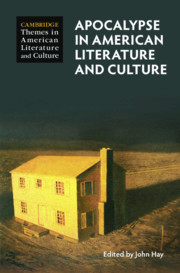Book contents
- Apocalypse in American Literature and Culture
- Cambridge Themes in American Literature and Culture
- Apocalypse in American Literature and Culture
- Copyright page
- Contents
- Figures
- Contributors
- Introduction The United States of Apocalypse
- Part I America as Apocalypse
- Part II American Apocalypse in (and out of) History
- Chapter 5 The Puritans Prepare for the Second Coming
- Chapter 6 The American Revolution as Extinction and Rebirth
- Chapter 7 Race, American Enlightenment, and the End Times
- Chapter 8 Sentimental Premonitions and Antebellum Spectacle
- Chapter 9 Antebellum Anticipations of Annihilation
- Chapter 10 The Apocalyptic Fury of the Civil War
- Chapter 11 Apocalyptic Form in the American Fin de Siècle
- Chapter 12 The Ruins of American Modernism
- Chapter 13 Mutually Assured Destruction in Cold War/Postwar America
- Chapter 14 Postmodern American Literature at the End of History
- Chapter 15 Ecology, Ethics, and the Apocalyptic Lyric in Recent American Poetry
- Chapter 16 Disaster Response in Post-2000 American Apocalyptic Fiction
- Part III Varieties of Apocalyptic Experience
- Further Reading
- Index
Chapter 16 - Disaster Response in Post-2000 American Apocalyptic Fiction
from Part II - American Apocalypse in (and out of) History
Published online by Cambridge University Press: 03 December 2020
- Apocalypse in American Literature and Culture
- Cambridge Themes in American Literature and Culture
- Apocalypse in American Literature and Culture
- Copyright page
- Contents
- Figures
- Contributors
- Introduction The United States of Apocalypse
- Part I America as Apocalypse
- Part II American Apocalypse in (and out of) History
- Chapter 5 The Puritans Prepare for the Second Coming
- Chapter 6 The American Revolution as Extinction and Rebirth
- Chapter 7 Race, American Enlightenment, and the End Times
- Chapter 8 Sentimental Premonitions and Antebellum Spectacle
- Chapter 9 Antebellum Anticipations of Annihilation
- Chapter 10 The Apocalyptic Fury of the Civil War
- Chapter 11 Apocalyptic Form in the American Fin de Siècle
- Chapter 12 The Ruins of American Modernism
- Chapter 13 Mutually Assured Destruction in Cold War/Postwar America
- Chapter 14 Postmodern American Literature at the End of History
- Chapter 15 Ecology, Ethics, and the Apocalyptic Lyric in Recent American Poetry
- Chapter 16 Disaster Response in Post-2000 American Apocalyptic Fiction
- Part III Varieties of Apocalyptic Experience
- Further Reading
- Index
Summary
In the face of growing alarm about climate change, contemporary scholars of apocalyptic fiction have begun to raise pragmatic questions about this genre’s effects: What responses does apocalyptic narrative condition readers to have before, during, and after a catastrophic event? Many critics have objected to the clichéd content of dystopian apocalyptic narratives, claiming that their bleak visions induce resignation in readers rather than a will to assert their political and personal agency. Meanwhile, a number of scholars associated with “disaster studies” have noted that the history of twentieth-century disasters suggests that people actually tend to be at their most compassionate after a catastrophe. In response to this tension, this essay takes a dialectical approach to understanding both the critical and reparative aspects of twenty-first-century American apocalyptic fiction. In the first half, it demonstrates that the violent mythmaking in this work is both symptomatic of the “elite panic” characterized by disaster studies and reflective of other decidedly American ideologies. The second half identifies how some of these same apocalyptic texts complicate or even counteract expectations of panic, theft, and violence, providing insights for how readers might cultivate cooperation and community in the wake of an apocalyptic event.
Keywords
- Type
- Chapter
- Information
- Apocalypse in American Literature and Culture , pp. 212 - 224Publisher: Cambridge University PressPrint publication year: 2020



